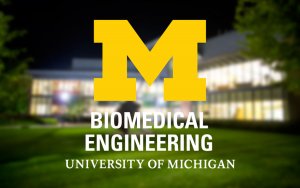Presented By: Biomedical Engineering
"Investigating How Dynamic Mechanical Strain in the Lung Tumor Microenvironment Influences Drug Resistance"
BME Seminar Series: Youjin Cho, M.D., The Ohio State University

Lung cancer is the leading cause of cancer-related deaths in the United States. In-vivo, alveolar epithelial cells normally experience 15% cyclic strain while increased tumor stiffness can result in a 40-fold decrease in cyclic strain. Although biomechanical factors in the tumor microenvironment have been shown to be a significant driver of cancer progression, there is limited information about how biophysical forces alter tumor development and drug resistance in lung adenocarcinoma cells. Therefore, the first goal of this study was to use computational and in-vitro models to investigate how changes in tumor microenvironment mechanics alter Erlotinib sensitivity. We also sought to develop a novel, non-invasive way to characterize lung tumor mechanics. Although magnetic resonance electrography (MRE) has been used to measure the mechanical stiffness of soft tissues and quantify a 3-fold increase in lung tissue stiffness in fibrotic patients, MRE has not been used to evaluate the stiffness profile of tumors within lung cancer patients. Therefore, in this study, we also conduct a proof-of-concept evaluation to demonstrate the ability of MRE to measure changes in lung tissue stiffness with a long-term goal of applying this technique to patients at risk for developing lung cancer. Our data indicate that cyclic stretching in the lung tumor microenvironment facilitate Erlotinib resistance. Characterizing tumor strain on a patient-specific basis may represent a novel approach to predict drug resistance and/or efficacy. We are currently using MRE measurements of lung stiffness to develop patient-specific computational models that can quantify mechanical strain at the local level. We are also designing studies to perform MRE in patient populations at risk for lung cancer (i.e. subjects with pulmonary nodules) and designing in-vitro studies that can simulate the complex biomechanics of lung tumors.
Youjin Cho, M.D., is a Ph.D. student in Biomedical Engineering at The Ohio State University.
Youjin Cho, M.D., is a Ph.D. student in Biomedical Engineering at The Ohio State University.